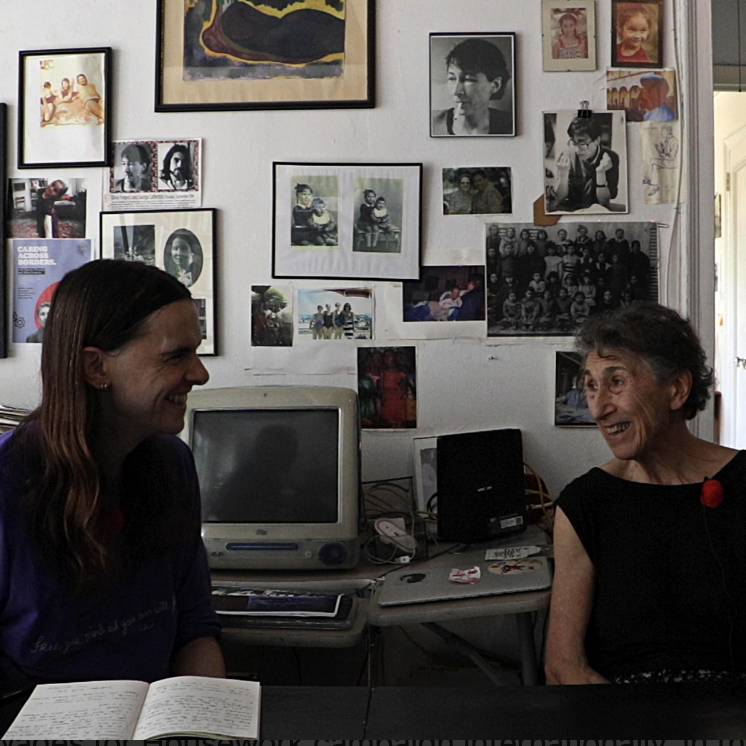
COMMONALITIES articulates questions about establishing and sustaining knowledge commons under the pressures of extractive capitalism. It addresses concerns of accessibility to knowledge and its stakeholders. It also looks at how commonist methodologies such as peer- and lifelong learning function within creative learning and Institutions of Higher Art Education and how activist knowledge production and tacit knowledge can navigate within the institution and avoid capture.

Silvia Federici (she/her) is a feminist writer, teacher, and militant. In 1972, she was co-founder of the International Feminist Collective, which launched the Wages for Housework campaign internationally. In the 1990s, after a period of teaching and research in Nigeria, she was active in the anti-globalization movement and the U.S. anti-death penalty movement. She is one of the co-founders of the Committee for Academic Freedom in Africa, an organization dedicated to generating support for the struggles of students and teachers in Africa against the structural adjustment of African economies and education systems. From 1987 to 2005, she also taught international studies, women’s studies, and political philosophy courses at Hofstra University in Hempstead, NY. Her decades of research and political organizing accompany a long list of publications on philosophy and feminist theory, women’s history, education, culture, international politics, and more recently the worldwide struggle against capitalist globalization and for a feminist reconstruction of the commons. Her steadfast commitment to these issues resounds in her focus on autonomy in what she calls self-reproducing movements as a powerful challenge to capitalism through the construction of new social relations.
Jack Hogan (they/them) is an artist and architect from Waterford, Ireland. They focus on the rich sociality of everyday life and what constitutes good shared lives beyond the nuclear family. They foreground friendship, and entwined people and places, instead of individuated subjects. They are currently participating in the Whitney Independent Study Program and recently exhibited in the Athens Biennale, Bronx Calling: The Fifth AIM Biennial and Everything is Common at Artists Space in New York. linktree.com/jackhogan

Brandy Butler is a performance artist, musician, educator, mother, and activist who spends their time creating creative opportunities at the interface of art and community. They hold a BA in jazz from the University of the Arts in Philadelphia, an MA in vocal pedagogy as well as a MA in elementary music education from the Zurich University of the Arts. Brandy is an organizational member of the African feminist diaspora collective Bla*sh, on the board of Helvetia Rockt, co-founder of the feminist think-tank collective Mino, which creates new opportunities for increasing the visibility of diversity in the Swiss music scene and has been active in early education and primary schooling for over 15 years. Brandy is the founder of Switzerland’s first ever Drag Story Time, managing and performing with several drag folx who are dedicated to creating fun atmospheres, where children ages 3-8 can be free to play and experiment with their own gender identity.
Learn more about traveling in time, futures thinking and Live Action Role-Play
The COMMONALITIES Research and Action Group were put together in the year 2035 by an unknown algorithm. This was the result of each core member working independently on questions surrounding the establishment and sustenance of the knowledge commons under the pressures of extractive capitalism.
Through their collaborative and collective working methods and shared connections, the group has come to centre their communal interests and experiences, such as peer and lifelong learning and activist knowledge production. For COMMONALITIES, art is not a single, canonised idea but something defined and redefined from multiple perspectives. Moreover, for the group, art must have multiple functions in society for COMMONALITIES to deem it as such, art is never for art’s sake.
Though nomadic in nature with large circular time gaps between meetups and research phases, COMMONALITIES Action and Research Group have a number of core principles that keep them sustained and bound. These include:
1. Truth must always be considered in multiples,
2. Knowledge must always be stored and disseminated in open forms,
3. Time must be treated as circular in nature,
4. Technology is essential in the world but only if the ways we use it must be consistently monitored and reconsidered, and
5. Boundaries towards knowledge must always remain porous.
These principles contribute to COMMONALITIES collective belief that the increased understanding of one’s values, perspectives, and preferences, means also acknowledging that one never perceives from a neutral or objective position.
Learning from the Commons...
What are your favourite reads on the topic?
Share them with us in the comment function below.
Discussion
No feedback has been added yet
Share a Thought